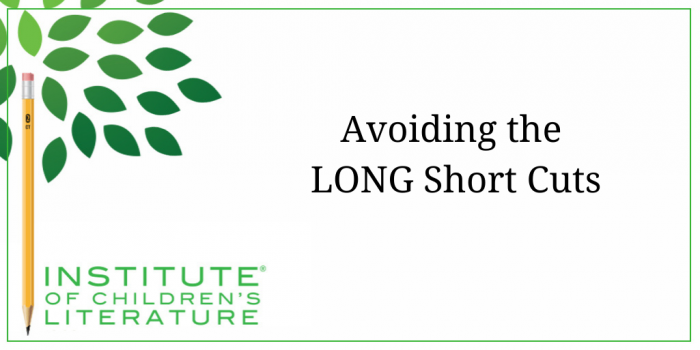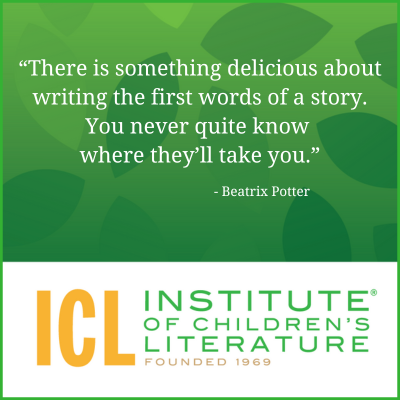1000 N. West Street #1200, Wilmington, DE 19801
© 2024 Direct Learning Systems, Inc. All rights reserved.

When I was in elementary school, we lived about four blocks from the school. It was a straight shot from the schoolyard to my house. No turns. No problem. Starting in second grade, I was supposed to walk home every day with my little brother.

Right, try getting a little brother to do anything just because you’re the older, wiser one.
I understand the lure of my brother’s shortcuts. They were untraveled roads. They might have hidden joys that weren’t part of the normal dull trudge home. We could be “ground breakers.” Unfortunately, as exciting as his shortcuts might be, they always ended up taking a lot longer and sometimes we got lost and didn’t make our destination at all (under our own steam.) And they could have even been dangerous.
Sometimes I still feel some of the same frustration that I felt in the face of my brother’s “shortcuts” only today, I feel it for those looking for a good writing shortcut. A little ground breaking, new, exciting way to reach the goal of publication. Something different. Something that looks less long, hard, and trudge-like.
What’s wrong with a nice shortcut, someone offering to publish “new voices” that the other publishers don’t want to hear? Well, first, it’s based on a lie. The lie is that recognized publishers don’t publish new voices. They do. They want new voices. Even more, they need them. One of the things I do these days is review books, so I get lots and lots of books to read from all the major publishers, and MANY of those books represent the author’s first published book. Publishers want new voices. But they must be new READY voices and they must be something the publisher believes they can sell. Getting ready to be one of those voices takes time and trudging. There just aren’t many born with writing skill, it takes practice, training, and nasty hard work.

And the agents shouting about their passion to focus on “new voices” can be even worse. At least the vanity press gives you a product you can hold in your hand. Many of those agents just take your money, telling you that all writers have to pay their agents when they start out. Then they submit scattershot to the same tiny publishers the author could have approached on his/her own.
But isn’t it true that you have to have an agent? And isn’t it true that agents need to be paid too? Not all multi-published children’s writers even bother with agents. And second, authors do not pay agents. Agents receive a cut of the deal they make. Think of them as “Realtors” for your book. You don’t pay them, but they do get a cut of the end deal.
So the agents get paid when their writers get paid; they get a cut of the money they make for us. That gives them an incentive to make us as much money as possible. If, instead, the writer simply hands an agent a check at the beginning of the relationship, the agent doesn’t have much incentive to do anything. And many of the “pay me first” agents don’t do anything…many have never sold a single book. Others have only gotten the exact same deal the writer could have gotten on his/her own. A reputable agent does so much more.
We live in a technological wonder world that is making it very hard for us to face the reality of publishing. Writing for publication is hard work. A lot of parts of the process are no fun at all. And even the no fun parts take way too long. Everything in our lives is being streamlined and made faster; why not publishing? I don’t know. I just know what my destination is and I choose to follow the road that will get me there. I choose not to wander off to see if another path might be easier or cheerier, not unless I thoroughly research the path for good and bad and decide it meets my goals.

Why go through the years of commercial book publishing when your whole audience is in your grasp? And why learn how to do all the things a publisher does well, when there are vanity presses who can do it for you? There’s nothing wrong with that. But if you take the “family and friends book” path, you won’t reach the “thousands of kid readers” destination. They don’t go to the same place; they CAN’T go to the same place.
So, what road takes you to the destination of having many readers whom you don’t have to go drum up yourself? First, write the book, and take your time. Write it well. Then write it better. Then write it better still. Then write it better again. Work on it, stew over it, sweat some, keep polishing and pruning and reshaping until there isn’t a single sentence that hasn’t seen your scrutiny over and over again. Do it until you know every possible way to say each thing, and you know you’ve said it the best possible way. Honestly, I’ve read slush pile manuscripts, and the majority of ones that are actually coherent were just sent too soon…they could have been good, but they weren’t. Don’t let impatience kill your book.
Honestly, write that in big letters on a sheet of paper and post it near your writing nook: DON’T LET IMPATIENCE KILL YOUR BOOK!
 Learn the Market
Learn the MarketSecond, meet the market. Know what’s out there. Know what books by *first time* authors are in your bookstore. Read them and re-read them until you feel sure in your heart that you know why an editor bought that particular book. Then apply those lessons to your book. Don’t try to write THEIR book, just try to revise your own to the point where you can answer the question “Why will an editor buy your book?” Don’t ever say the words, “My story is better than a bunch of the crap out there.” Instead, ask yourself why your book is worthy of a spot alongside the best of the books out there. Do that, and you have a better chance of making your book THAT GOOD.
Third, get a market guide and pour over it. Then research all the publishers that sound like they would be right for you. Then find books by that publisher and read them. If you cannot find any books by that publisher at the library or bookstore, ask yourself: do I want a book that won’t be in libraries or bookstores? If not, keep looking until you find the match that’s right for you. Look specifically for publishers that bought books for the same “why” that you came up with when you asked yourself honestly: why would someone buy MY book?
Fourth, learn the address of your final destination. Get their guidelines. Find out how they want you to submit. Submitting wrong can be the same as not submitting. Why send it if they won’t read it? Yes, it takes time…everything about this business takes time. Really, it does. But let’s assume you invested the time in making it the best book possible; why would you then not bother making sure it found the best home possible?
Fifth, send it off and start your next book. Don’t stew about things in the mail. If you can’t get your groove on for another book, write a magazine piece something you can force yourself to sit down for. Or try poetry, I know several writers who write poetry to clear their minds between books. The key is to occupy yourself with something besides fretting.
Sixth, when you hear back, learn but don’t break. Learning makes us do things better. Breaking makes us quit and try something easier. All the published authors whose books you studied at the second step, they were learners. The book you held in your hands when you studied the markets, that may have been the author’s first PUBLISHED book, but the odds are really good that it wasn’t the author’s first WRITTEN book. They kept at it and write a book that an editor loved and a publisher believed in. You can do that too.
Yeah, the right road home from school wasn’t much fun when I was a kid. And sometimes it really seemed I had trudged it way too much. But at the end, I was always home. And honestly, that’s what mattered most to me.
With over 100 books in publication, Jan Fields writes both chapter books for children and mystery novels for adults. She’s also known for a variety of experiences teaching writing, from one session SCBWI events to lengthier Highlights Foundation workshops to these blog posts for the Institute of Children’s Literature. As a former ICL instructor, Jan enjoys equipping writers for success in whatever way she can.
1000 N. West Street #1200, Wilmington, DE 19801
© 2024 Direct Learning Systems, Inc. All rights reserved.
1000 N. West Street #1200, Wilmington, DE 19801
© 2024 Direct Learning Systems, Inc. All rights reserved.
1000 N. West Street #1200, Wilmington, DE 19801
© 2024 Direct Learning Systems, Inc. All rights reserved.
1000 N. West Street #1200, Wilmington, DE 19801
© 2025 Direct Learning Systems, Inc. All rights reserved.
1000 N. West Street #1200, Wilmington, DE 19801
©2025 Direct Learning Systems, Inc. All rights reserved. Privacy Policy.
1 Comment